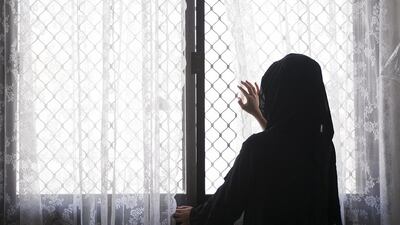DUBAI // A majority of the victims of human trafficking in the UAE are part of an international illegal trade that knows no boundaries, but Ewa’a offers shelter to those who want to prepare for a new life.
“I came here almost three years ago after my parents tried to sell me off in certain ways,” said R F, 20. “I’m trying to figure out my future and I want to learn to make myself better.”
Typically, residents at Ewa’a, a shelter for human-trafficking victims, stay for up to six months as the organisation helps them to get back on their feet. Ewa’a provides services such as counselling, government permits for safe passage back to their home countries and financial assistance after they arrive.
R F’s case, however, was different to most others.
“She showed up at our doorstep with her younger brother and six other girls, who she claimed were her sisters,” said Maitha Al Mazrouei, corporate communications manager at Ewa’a. “They told us that they were all victims whose parents had attempted to traffic them.”
After initial blood and DNA tests, shelter workers discovered that only the boy was related to R F.
“This is a unique case,” Ms Al Mazrouei said. “The father would take these girls to parties and sell them off for prostitution. R F came to us when she was 17 and since then we’ve been trying to figure out a solution for her.”
R F came to the UAE from Iraq with her family 10 years ago, and now has nowhere to go. Her parents are in jail for trafficking, and she has no family in Iraq. Complicating matters is finding a host country that will take R F as well as her brother.
“She came here and practically didn’t speak,” said Shaima Al Zaabi, a social worker. “She didn’t want to say anything. It was clear that she had gone through unspeakable things.”
Although laws combating human trafficking are in place in the UAE, workers at Ewa'a said the first step was raising awareness about prostitution and its relationship to human trafficking. "Usually the traffickers tell the victims that they'll get them a good job when they arrive," Ms Al Mazrouei said. "Most of the time they are beaten and forced to work as prostitutes. Many of them face a language barrier and their only source of information is the trafficker."
R F was given counselling, a safe place to live and the support of the organisation. She also found solace in art. “I spend hours lost in painting,” she said. “I don’t even know that the time has passed. I can express myself better in art.”
Ewa’a’s work with victims begins with making sure everyone knows there is a place for them.
“These girls are being used in the worst way, it’s awful,” Ms Al Zaabi said.
“They’re being forced to be with 20 to 30 people a day, it’s absolutely awful to imagine. They come to us with their will broken. We need to tell society that this is a problem and help the victims.”
Because Ewa’a also works with the police and embassies, getting victims to the shelter is only the first step in the process.
“Most of them just want someone to look into their eyes and know that you believe them. They just want to talk and look for someone to listen and help them,” Ms Al Zaabi said. “Their trust has been broken.”
nalwasmi@thenational.ae

